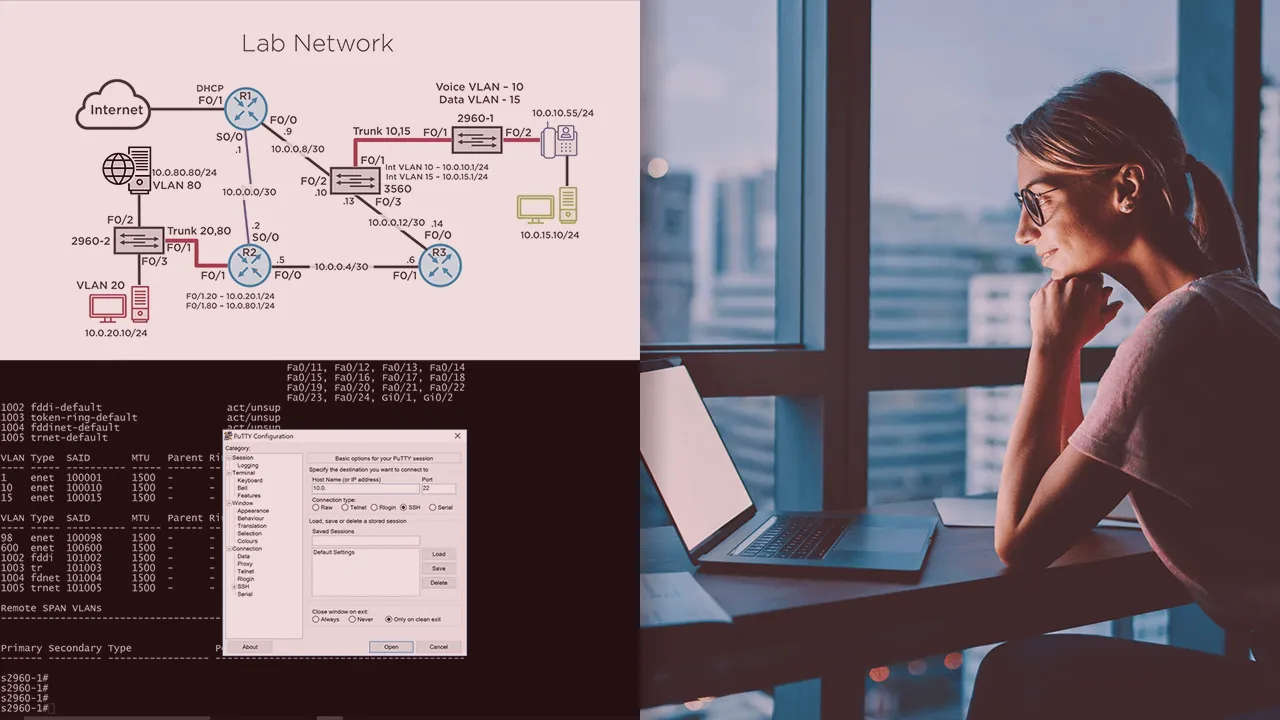
Building Hardware Labs for CCNA Study 
This course provides an in-depth review of the topics covered on the CCNA exam by allowing students to build and design their own network, and then troubleshoot its setup. Through this hands-on approach, students gain the knowledge and skills necessary to successfully pass the CCNA exam. ▼
ADVERTISEMENT
Course Feature
![]() Cost:
Cost:
Free Trial
![]() Provider:
Provider:
Pluralsight
![]() Certificate:
Certificate:
Paid Certification
![]() Language:
Language:
English
![]() Start Date:
Start Date:
On-Demand
Course Overview
❗The content presented here is sourced directly from Pluralsight platform. For comprehensive course details, including enrollment information, simply click on the 'Go to class' link on our website.
Updated in [March 06th, 2023]
This course, Building Hardware Labs for CCNA Study, provides an overview of the topics covered on the CCNA exam. Students will review the most important topics covered in the CCNA exam preparation by building and designing a network, and then troubleshooting its setup. The course begins by creating study sheets, where students are encouraged to write down and memorize before the exam. Next, students will design a network, incorporating as many of the most important technical topics as possible from the CCNA studies. Finally, students will build and troubleshoot the network, with provided sample configurations to use in their own lab. By the end of this course, students will have practiced the most fundamental topics covered on the CCNA exam.
[Applications]
Upon completion of this course, students should be able to apply the knowledge they have gained to build and troubleshoot their own hardware labs for CCNA study. They should also be able to use the sample configurations provided to create their own networks and practice the topics covered on the CCNA exam. Additionally, students should be able to use the study sheets they have created to review and memorize the topics covered on the CCNA exam.
[Career Paths]
1. Network Engineer: Network engineers are responsible for designing, implementing, and maintaining computer networks. They must have a strong understanding of network protocols, routing, and switching. As technology advances, network engineers must stay up to date with the latest trends and technologies.
2. Network Administrator: Network administrators are responsible for the day-to-day operations of a network. They must be able to troubleshoot and resolve network issues, as well as configure and maintain network hardware and software. With the increasing complexity of networks, network administrators must have a strong understanding of network protocols and security.
3. Network Security Analyst: Network security analysts are responsible for ensuring the security of a network. They must have a strong understanding of network security protocols and technologies, as well as the ability to identify and mitigate potential security threats. As technology advances, network security analysts must stay up to date with the latest trends and technologies.
4. Network Architect: Network architects are responsible for designing and implementing large-scale networks. They must have a strong understanding of network protocols, routing, and switching, as well as the ability to design and implement complex networks. With the increasing complexity of networks, network architects must stay up to date with the latest trends and technologies.
[Education Paths]
Recommended Degree Paths:
1. Bachelor of Science in Computer Science: This degree path provides students with a comprehensive understanding of computer science, including topics such as programming, software engineering, computer networks, and operating systems. Students will also learn about the latest trends in computer technology and how to apply them to real-world problems. This degree path is ideal for those looking to pursue a career in the IT industry.
2. Bachelor of Science in Information Technology: This degree path focuses on the application of technology to solve business problems. Students will learn about the latest trends in information technology, such as cloud computing, big data, and artificial intelligence. They will also gain an understanding of the fundamentals of computer networks, software engineering, and database management. This degree path is ideal for those looking to pursue a career in the IT industry.
3. Master of Science in Computer Science: This degree path provides students with an advanced understanding of computer science, including topics such as artificial intelligence, machine learning, and computer networks. Students will also learn about the latest trends in computer technology and how to apply them to real-world problems. This degree path is ideal for those looking to pursue a career in the IT industry or research.
4. Master of Science in Information Technology: This degree path focuses on the application of technology to solve business problems. Students will learn about the latest trends in information technology, such as cloud computing, big data, and artificial intelligence. They will also gain an understanding of the fundamentals of computer networks, software engineering, and database management. This degree path is ideal for those looking to pursue a career in the IT industry or research.
Course Provider

Provider Pluralsight's Stats at AZClass
Pluralsight ranked 16th on the Best Medium Workplaces List.
Pluralsight ranked 20th on the Forbes Cloud 100 list of the top 100 private cloud companies in the world.
Pluralsight Ranked on the Best Workplaces for Women List for the second consecutive year.
AZ Class hope that this free trial Pluralsight course can help your Cisco Certification skills no matter in career or in further education. Even if you are only slightly interested, you can take Building Hardware Labs for CCNA Study course with confidence!
Discussion and Reviews
0.0 (Based on 0 reviews)
Explore Similar Online Courses

The Nature of Code

Scrum Master I certification Practice Tests questions

Python for Informatics: Exploring Information

Social Network Analysis

Introduction to Systematic Review and Meta-Analysis

The Analytics Edge

DCO042 - Python For Informatics

Causal Diagrams: Draw Your Assumptions Before Your Conclusions

Whole genome sequencing of bacterial genomes - tools and applications

CCNA (Cisco Certified Network Associate) Course

Packet Tracer labs for the CCNA 200-301 exam: Practical labs


Start your review of Building Hardware Labs for CCNA Study